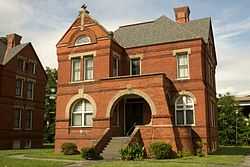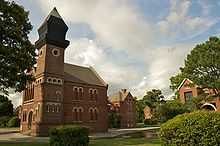William Enston Home
|
Enston, William, Home | |
 | |
|
One of the original twenty-four William Enston Home cottages | |
 | |
| Location | 900 King St., Charleston, South Carolina |
|---|---|
| Coordinates | 32°48′5″N 79°56′56″W / 32.80139°N 79.94889°WCoordinates: 32°48′5″N 79°56′56″W / 32.80139°N 79.94889°W |
| Area | 12.1 acres (4.9 ha) |
| Built | 1884 |
| Architect | Howe, W.B.W.; Hering, Rudolph, et al. |
| Architectural style | Bungalow/Craftsman, Queen Anne, Romanesque |
| Governing body | Local |
| NRHP Reference # | 96000493[1] |
| Added to NRHP | April 25, 1996 |
The William Enston Home, located at 900 King St., Charleston, South Carolina, is a complex of many buildings all constructed in Romanesque Revival architecture, a rare style in Charleston.[2][3] Twenty-four cottages were constructed in 1887 along with a memorial chapel at the center with a campanile style tower, and it was reserved for white residents. An infirmary was added in 1931 and later converted into a superintendent's home.
In 2006, construction was undertaken on a series of additional cottages which were meant to complete the plan for the community. These cottages, located at the southern edge of the property, are reminiscent of the original design but lack the architectural detail of the originals. Today the complex is owned by the Housing Authority of Charleston and the restored cottages are home to persons of low to moderate income.

History
William Enston was a prosperous furniture maker, merchant, and steamship magnate who left his fortune for the creation of a home for the white elderly. He was born on May 5, 1808, in Canterbury, England, and immigrated to Philadelphia, Pennsylvania with his father in 1825. In 1832, he moved to Charleston, South Carolina and later married Hannah Shuttleworth of Colsterworth, England. He began a small store on King Street. (later building the large structure still standing at 187-191 King St.[4]) He eventually amassed a fortune through real estate and commercial shipping.[5] He died on March 23, 1860, leaving a fortune valued at $1 million, but the Civil War reduced its value to half that amount.
Site work began in 1884,[6] but construction of the housing units did not begin for a few more years. The City of Charleston received the proceeds of the estate in 1886 following the death of Enston's widow. In 1887, twenty-seven years after the death of Enston, W.B.W. Howe, Jr. designed the complex of two-story brick cottages according to Enston's instructions. The Home was to be modeled on similar British institutions, specifically one Enston was familiar with in his native Canterbury. Enston specified that the complex be composed of neat and convenient two-story brick cottages with at least eight acres of land. He also stipulated that potential residents be the old and sick, from 45 to 75 years old, of "good honest character," and not suffering from "lunacy." Original streets in the development reflect people and places from Enston's life including Shutterworth (his wife's maiden name), Canterbury (his hometown), and Coltersworth (his wife's hometown).
In 1991, the Charleston Housing Authority contracted to buy the property from the Enston Foundation for $625,000.[7] The deal was cancelled in December 1991, however, when the Housing Authority realized the extent of repair work needed (estimated at $1.7 million).[8] The authority had 13 new units built in 2006, designed in a contemporary style by Judy Stephens.[9]
| Wikimedia Commons has media related to William Enston Home. |
Gallery
-
The gate at the William Enston Home in Charleston, South Carolina features wrought iron gates.
-
Even the water tower of the William Enston Home in Charleston, South Carolina displays Victorian brickwork.
-
The small utility building at the William Enston Home in Charleston, South Carolina is built of dark red brick.
-
The gymnasium of the William Enston Home in Charleston, South Carolina was later converted into a residence for the superintendent.
-
The new units at the William Enston Home in Charleston, South Carolina were vaguely meant to replicate the historic units.
Sources
- Robert P. Stockton, Information for Guides of Historic Charleston, South Carolina 312-13 (1985).
References
- ↑ "National Register Information System". National Register of Historic Places. National Park Service. 2010-07-09.
- ↑ Poston, Jonathon H. (May 1, 1995). "The William Enston Home" (pdf). National Register of Historic Places - Nomination and Inventory. Retrieved 11 June 2012.
- ↑ "The William Enston Home, Charleston County (900 King St., Charleston)". National Register Properties in South Carolina. South Carolina Department of Archives and History. Retrieved 11 June 2012.
- ↑ Thomas, W.H.J. (Apr 21, 1969). "Philanthropist Owned Building". Charleston News & Courier. pp. 11–A. Retrieved October 17, 2013.
- ↑ "S.C. Birthday". Charleston News & Courier. May 5, 1949. pp. 4–D. Retrieved October 17, 2013.
- ↑ "The William Enston Home". Charleston News & Courier. Sep 1, 1884. pp. 1–A. Retrieved October 17, 2013.
- ↑ Kerri Morgan (Sep 8, 1991). "Enston Homes to become agency's newest project". Charleston Post & Courier. p. B1. Retrieved May 25, 2013.
- ↑ Kerri Morgan (Dec 25, 1991). "Authority scraps build to acquire Enston Homes". Charleston Post & Courier. p. B1.
- ↑ Robert Behre (Feb 19, 2007). "Additions to Enston Homes Build on 19th-Century Dream". Charleston Post & Courier. p. B1. Retrieved May 25, 2013.
External links
- Historic Charleston's Religious and Community Buildings, a National Park Service Discover Our Shared Heritage Travel Itinerary
- The William Enston Home, Celebrate Charleston
| |||||||||||||||||||||






